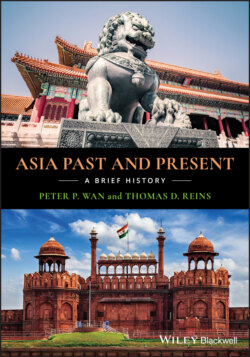Читать книгу Asia Past and Present - Peter P. Wan - Страница 70
Why Not?
ОглавлениеMing China more or less coincided with the Europe that was emerging from the Middle Ages and entering the Modern Age. But China never took the step forward. China was large and prosperous. It had a large and thriving domestic market, advanced science and technology, a huge reserve of capital, and a vigorous merchant class, so why didn’t modern capitalism develop there? Scholars cite a range of reasons, but they all boil down to the absolute power of the emperor and his government.
Emperors always viewed large concentrations of wealth as prey or threat. With absolute power and unrestrained by law, they could arbitrarily prevent the formation of great concentrations of wealth, or exploit or destroy it.
1 State monopolies had existed since the Han Dynasty. These supersized economic entities used ultra‐economic measures to take control of upper‐stream resources, such as rice, salt, iron, copper, gold, and silver. The imperial nation’s wealth was actually the private property of the emperor and a few high officials. They had many ways of confiscating large concentrations of private wealth on false charges or demanding big merchants to donate to state projects and supply the government with funds for war. The cards were stacked against the merchants without government ties.
2 The state ideology of Confucianism ranked merchants at the very bottom of society. The ultimate goal of a rich merchant was, rather than encouraging his sons to be more successful in his business, to instead give his sons a good education in the hope that someday they would pass the imperial examinations and enter the establishment as government officials. China’s merchant class could never develop into a revolutionary force as its Western counterparts did.
3 The abolition of primogeniture was a uniquely Chinese way to prevent wealth concentration and weaken potential threats to the throne. By demanding the equal division of an inheritance among the sons, the fortunes of a potential rival were scattered and the threat was defused.
Ming merchant Shen Wansan (1296–1376) was a good example of how vulnerable a wealthy merchant was, as he was exposed to the emperor’s arbitrary powers and unprotected by the law. Shen had accumulated his legendary wealth by doing overseas trade and expanding his landholdings. He was said to have made large gifts of gold and silver to Emperor Zhu Yuanzhang, and paid for one‐third of the cost of building the city wall of the capital Nanjing. But the paranoid and envious emperor saw him as a threat. He exiled Shen to the frontier and let him die there. Still unsatisfied, he later found excuses to imprison and execute major members of Shen’s extended family, thus bringing an end to the family commercial empire.
